2010 年山东省中小学教师招聘考试中学英语真题及答案
第一部分 教育理论与实践
Ⅰ.单项选择题(本大题共 4 小题,每小题 1 分,共 4 分)
1.双轨制在()表现得非常典型。
A. 美国
C. 苏联
B. 英国
D. 中国
2.胆小畏缩,消极防御反应强,这是哪种气质类型的行为表现?()
A. 胆汁质 B. 多血质
C. 黏液质 D. 抑郁质
3.()根据“两难故事法”的实验形成了儿童道德发展的理论。
A. 皮亚杰 B. 科尔伯格
C. 杜威 D. 马斯洛
4.各种类型的测验被广泛运用于教育教学之中,这是在教育心理学的()。
A. 初创时期 B. 发展时期
C. 成熟时期 D. 深化拓展时期
Ⅱ.多项选择题(本大题共 3 小题,每小题 2 分,共 6 分)
1.合作学习理论认为,在班级教学中,学生群体的组织形式有三种,即()。
A. 竞争的 B. 相干的
C. 合作的 D. 不相干的
2.人际关系的功能主要体现在哪些方面?()
A. 幸福感 B. 归属感
C. 心理健康 D. 身体健康
3.学生智力差异主要表现在()。
A. 智力定义的差异 B. 智力类型的差异
C. 智力发展水平的差异 D. 智力表现早晚的差异
Ⅲ.简答题(本大题共 2 小题,每小题 5 分,共 10 分)
1.班主任班级管理的内容主要有哪些?
2.请简要回答学生发展的一般规律。
第二部分 英语专业基础知识
Ⅰ.词汇与结构/ Vocabulary and structure(15 分)
从每题所给的 A、B、C、D 四个选项中,选出可以填入空白处的最佳选项。
1.A person who has
one.
final say in an international company is usually
influential
A. a; the
C. the; the
B. the; an
D. a; an
2.The number of the stampslimited, so a number of peopleto have a look at them.
A. are; want
C. is; want
B. is; wants
D. are; wants
3.The company hopes to sell
B. million
A. millions
C. millions of D. million of
these machines.
4.It’s badfor a man to smoke in public places where smoking is not allowed.
�
A. behavior
C. manner
B. action
D. movement
5.Paul attends very
A. little; few
C. a little; a few
meetings,and when he does,he has very to say.
B. few; little
D. a few; a little
6.What the remote areas neededucation to children and what the children needgood
textbooks at the moment.
A. were; was
C. was; were
B. are; is
D. is; are
7.—I’m going to study engineering in Qinghua University tomorrow.
— ________________________________________________________.
A. All the best in your study
B. All the best with your study
C. All the best in your business D. All the best in your new job
8.A person ________ e
e
mails.
mail account is full won't be able to send or receive any
A. who
C. whose
B. whom
D. whoever
9.—Who told you about Follow Me?
up
— ________________________________________________________. I picked it
.
A. No one; my own
C. None; by myself
B. No one; myself
D. None; myself
10.
Zhou Lan,
her friends, is interested in this novel.
A. Both; and
C. Not only; but also
B. /; as well as
D. Either; or
11. It is sleeping late in the morning that
being late for work.
A. devotes to
C. refers to
D. leads to
12. Family education has a great
B. sticks to
on children in many ways.
A. result
C. disadvantage
B. danger
D. effect
13. Don’t all speak at once! , please.
A. Each at one time
C. One for each time
B. One by one time
D. One at a time
14. —This dress was last year’s style.
—I think it still looks perfect it has gone out this year.
A. so that
C. as if
B. even though
D. ever since
15. Don’t forget the day
you were received into the Youth League.
B. that
D. where
A. when
C. at which
Ⅱ.完形填空/Close(每小题 1 分,共 20 分)
阅读下列短文,掌握其大意,然后从每小题所给的四个选项中,选出最佳选项。
Many theories concerning the causes of juvenile delinquency crimes committed
�
by young people focus either on the individual or on society as the major contributing
influence. Theories 16 on the individual suggest that children engage in criminal
behavior 17 they were not sufficiently penalized for previous misdeeds or that they
have learned criminal behavior through 18 with others. Theories focusing on the role
of society suggest that children commit crimes in 19 to their failure to rise above
their socioeconomic status 20 as a rejection of middle
class values.
Most theories of juvenile delinquency have focused on children from
disadvantaged families, 21 the fact that children from wealthy homes also commit
crimes. The latter may commit crimes 22 lack of adequate parental control. All
theories, however, are tentative and are 23 to criticism.
Changes in the social structure may indirectly 24 juvenile crime rates. For
example, changes in the economy that 25 to fewer job opportunities for youth and
rising unemployment 26 make gainful employment increasingly difficult to obtain.
The resulting discontent may in27 lead more youths into criminal behavior.
Families have also 28 changes these years. More families consist of one parent
households or two working parents; 29, children are likely to have less supervision
at home, 30 was common in the traditional family 31. This lack of parental supervision
is thought to be an influence on juvenile crime rates. Other 32 causes of offensive
acts include frustration or failure in school, the increased 33 of drugs and alcohol,
and the growing 34 of child abuse and child neglect. All these conditions tend to
increase the probability of a child committing a criminal act, 35 a direct causal
relationship has not yet been established.
16.A. acting
B. relying
C. centering
D. cementing
17. A. before
C. until
B. unless
D. because
18. A. interactions
C. cooperation
B. assimilation
D. consultation
19. A. return
B. reply
C. reference
D. response
20. A. or
B. but rather
C. but
D. or else
21.A. considering
B. ignoring
C. highlighting
D. discarding
22. A. on
C. for
B. in
D. with
23. A. immune
B. resistant
C. sensitive
D. subject
24. A. affect
C. shock
25. A. point
C. come
B. reduce
D. reflect
B. lead
D. amount
26. A. in general
B. on average
C. by contrast D. at length
�
27. A. case
C. turn
B. short
D. essence
28. A. survived
B. noticed
C. undertaken D. experienced
29. A. contrarily
C. similarly
B. consequently
D. simultaneously
30. A. than
C. which
B. that
D. for
B. structure
C. concept D. heritage
31. A. system
32. A. assessable
B. identifiable
C. negligible D. incredible
33. A. expense
B. restriction
C. allocation D. availability
34. A. incidence B. awareness
C. exposure D. popularity
35. A. provided B. since
C. although D. supposing
Ⅲ.阅读理解/Reading comprehension(每小题 2 分,共 40 分)
A
at
Growing up in Philadelphia,Lieberman started cooking with his stay
home
dad when he was seven.His food loving family had two kitchens,and he quickly learned
what was the best way to bake his cakes.Lieberman improved his kitchen skills greatly
during a year abroad before college,learning from a cook in Italy and studying local
specialties(地方特色菜) in Germany,Spain and France.At Yale,he was known for
throwing dinner parties,single
handedly frying and baking while mixing drinks for
dozens of friends.Just for fun,he and some friends decided to tape a show named Campus
Cuisine about his cooking.Lieberman was a real college student showing his
classmates how to do things like making drinks out of dining
hall fruit.That helped
the show become very popular among the students.They would stop Lieberman after class
to ask for his advice on cooking.Tapes of the show were passed around,with which
his name went beyond the school and finally to the Food Network.
Food Network producer Flay hopes the young cook will find a place on the network
television.He says Lieberman’s charisma is the key.“Food TV isn’t about food
anymore,”says Flay,“It’s about your personality(个性) and finding a way to keep
people’s eyeballs on your show.”
But Lieberman isn’t putting all his eggs in one basket.After taping the first
season of the new show,Lieberman was back in his own small kitchen preparing
sandwiches.An airline company(航空公司) was looking for someone to come up with
a tasteful,inexpensive and easy to
make menu to serve on its flights.Lieberman
got the job.
36. We can learn from the text that Lieberman’s family .
A. have relatives in Europe
C. often hold parties
D. own a restaurant
B. love cooking at home
�
37. The Food Network got to know Lieberman .
A. at one of his parties
C. through his taped show
B. from his teachers
D. on a television program
38. What does the word “charisma” underlined in the text refer to?
A. A natural ability to attract others.
C. Lieberman’s after
class interest.
B. A way to show one’s achievement.
D. Lieberman’s fine cooking skill.
39. Why did the airline company give Lieberman the job?
A. Because he could prepare meals in a small kitchen.
B. Because he was famous for his shows on Food TV.
C. Because he was good at using eggs to make sandwiches.
D. Because he could cook cheap,delicious and simple meals.
40. What can we learn about Lieberman from the text?
A. He is clever but lonely.
C. He enjoys traveling around.
B. He is friendly and active.
D. He often changes his menus.
B
Some people bring out the best in you in a way that you might never have fully
realized on your own. My mom was one of those people.
My father died when I was nine months old, making my mom a single mother at the
age of eighteen. While I was growing up, we lived a very hard life. We had little
money, but my mom gave me a lot of love. Each night, she sat me on her lap and spoke
the words that would change my life, “Kemmons, you are certain to be a great man
and you can do anything in life if you work hard enough to get it.”
At fourteen, I was hit by a car and the doctors said I would never walk again.
Every day, my mother spoke to me in her gentle, loving voice, telling me that no
matter what those doctors said, I could walk again if I wanted to badly enough. She
drove that message so deep into my heart that I finally believed her. A year later
I returned to school—walking on my own!
When the Great Depression(大萧条)hit, my mom lost her job. Then I left school
to support the both of us. At that moment, I was determined never to be poor again.
Over the years, I experienced various levels of business success. But the real
turning point occurred on a vacation I took with my wife and five kids in 1951.I
was dissatisfied with the second
class hotels available for families and was angry
that they charged an extra$2 for each child. That was too expensive for the average
American family. I told my wife that I was going to open a motel (汽车旅馆)for
families that would never charge extra for children. There were plenty of doubters
at that time.
Not surprisingly, Mom was one of my strongest supporters. She worked behind the
desk and even designed the room style. As in any business, we experienced a lot of
challenges. But with my mother’s words deeply rooted in my soul, I never doubted
we would succeed. Fifteen years later, we had the largest hotel system in the world
—Holiday Inn. In 1979 my company had 1,759 inns in more than fifty countries with
an income of $ 1 billion a year.
You may not have started out life in the best situations. But if you can find
a task in life worth working for and believe in yourself, nothing can stop you.
�
41. What Kemmons’mom often told him during his childhood was
.
A.caring
C.encouraging
B.moving
D.interesting
42. According to the author, who played the most important role in making him walk
back to school again?
A.Doctors.
C.Friends.
B.Nurses.
D.Mom.
43. What caused Kemmons to start a motel by himself?
A. His terrible experience in the hotel.
B. His previous business success at various levels.
C. His mom’s support.
D. His wife’s suggestion.
44. Which of the following best describes Kemmons’mother?
A. Modest, helpful and hardworking.
B. Loving, supportive and strong
C. Careful, helpful and beautiful.
D. Strict, sensitive and supportive.
willed.
45. Which of the following led to Kemmons’ success according to the passage?
confidence, had work, higher education and a poor family
A. Self
B. Mom’s encouragement, clear goals, self
C. Clear goals, Mom’s encouragement, a poor family and higher education.
D. Mom’s encouragement, a poor family, higher education and opportunities.
confidence and hard work.
C
President Arling has put his long
awaited economic restructuring program
before the Congress. It provides a coordinated program of investment credits,
research grants, educational reforms, and tax changes designed to make American
industry more competitive. This is necessary to reverse the economic slide into
unemployment, lack of growth, and trade deficits that have plagued the economy for
the past six years.
The most liberal wing of the President’s party has called for stronger and more
direct action. They want an incomes policy to check inflation while Federal financing
helps rebuild industry behind a wall of protective tariffs.
The Republicans, however, decry even the modest, graduated tax increases in the
President’s program. They want tax cuts and a more open market. They say if Federal
money has to be injected into the economy, let it through defence spending.
Both these alternatives ignore the unique nature of the economic problem before
us. It is not simply a matter of markets or financing. The new technology allows
vastly increased production for those able to master it. But it also threatens those
who fail to adopt it with permanent second
class citizenship in the world economy.
If an industry cannot lever itself up to the leading stage of technological advances,
then it will not be able to compete effectively. If it cannot do this, no amount
of government protectionism or access to foreign markets can keep it profitable for
long. Without the profits and experience of technological excellence to reinvest,
that industry can only fall still further behind its foreign competitors.
�
So the crux is the technology and that is where the President’s program focused.
The danger is not that a plan will not be passed, it is that the ideologues of right
and left will distort the bill with amendments that will blur its focus on technology.
The economic restructuring plan should be passed intact. If we fail to restructure
our economy now, we may not get a second chance.
46. The focus of the President’s program is on
.
A. investment
C. technology
B. economy
D. tax
47. What is the requirement of the most liberal wing of the Democratic Party?
A. They want a more direct action.
B. They want an incomes policy to check inflation.
C. They want to rebuild industry.
D. They want a wall of protective tariffs.
48. What is the editor’s attitude?
B. Distaste.
D. Compromise.
.
A. Support.
C. Disapproval.
49. The danger to the plan lies in
A. the two parties’ objection
B. different ideas of the two parties about the plan
C. its passage
D. distortion
50. The passage is
.
A. a review
C. an advertisement
B. a preface
D. an editorial
D
Where is Love? How can we find Love?
The past ages of man have all been carefully labeled by anthropologists.
Descriptions like “Paleolithic Man”, “Neolithic Man”, etc., neatly sum up the
whole periods. When the time comes for anthropologists to turn their attention to
the twentieth century, they will surely choose the label “Legless Man”. Histories
of the time will go something like this: “In the twentieth century, people forgot
how to use their legs. Men and women moved about in cars, buses and trains from a
very early age. There were lifts and escalators in all large buildings to prevent
people from walking. This situation was forced upon earth dwellers of that time
because of miles each day. But the surprising thing is that they didn’t use their
legs even when they went on holiday. They built cable railways, ski lifts and roads
to the top of every huge mountain. All the beauty spots on earth were marred by the
presence of large car parks.”
The future history books might also record that we were deprived of the use of
our eyes. In our hurry to get from one place to another, we failed to see anything
on the way. Air travel gives you a bird’s
eye view of the world—or even less if
the wing of the aircraft happens to get in your way. When you travel by car or train
a blurred image of the countryside constantly smears the windows. Car drivers, in
particular, are forever obsessed with the urge to go on and on: they never want to
�
stop. Is it the lure of the great motorways, or what? And as for sea travel, it hardly
deserves mention. It is perfectly summed up in the words of the old song: “I joined
the navy to see the world, and what did I see? I saw the sea.”The typical twentieth
century traveler is the man who always says, “I’ve been there.”You mention the
remotest, most evocative place
names in the world like El Dorado, Kabul, Irkutsk
and someone is bound to say,“I’ve been there”—meaning,“I drove through it at
100 miles an hour on the way to somewhere else.”
When you travel at high speed, the present means nothing: you live mainly in
the future because you spend most of your time looking forward to arriving at some
other place. But actual arrival, when it is achieved, is meaningless. You want to
move on again. By traveling like this, you suspend all experience; the present ceases
to be a reality: you might just as well be dead. The traveler on foot, on the other
hand, lives constantly in the present. For him traveling and arriving are one and
the same thing: he arrives somewhere with every step he makes. He experiences the
present moment with his eyes, his ears and the whole of his body. At the end of his
journey he feels a delicious physical weariness. He knows that sound. Satisfying
sleep will be his: the just reward of all true travelers.
51. Anthropologists label nowadays’men “Legless” because
.
A. people forget how to use their legs
B. people prefer cars, buses and trains
C. lifts and escalators prevent people from walking
D. there are a lot of transportation devices
52. Travelling at high speed means
.
A. people’s focus on the future
C. satisfying drivers’great thrill
B. a pleasure
D. a necessity of life
53. Why does the author say “we were deprived of the use of our eyes”?
A. People won’t use their eyes.
B. In traveling at high speed, eyes become useless.
C. People can’t see anything on their way of travel.
D. People want to sleep during travelling.
54. What is the purpose of the author in writing this passage?
A. Legs become weaker.
B. Modern means of transportation make the world a small place.
C. There is no need to use eyes.
D. The best way to travel is on foot.
eye view”mean?
55. What does“a bird’s
B. A bird looks at a beautiful view.
A. See a view with a bird’s eyes.
C. It is a general view from a high position.
Ⅳ.阅读表达/Reading expression (每小题 3 分,共 15 分)
The world’s first subway was built in London in 1863. At the time, the government
was looking for a way to reduce traffic problems in the city of London. The poor
areas of the city were so crowded with people that it was almost impossible for horse
carriages (the taxis of those days ) to get around. The city officials were interested
in trying to make it possible for workers to live outside of London and travel easily
D. It is a scenic place.
�
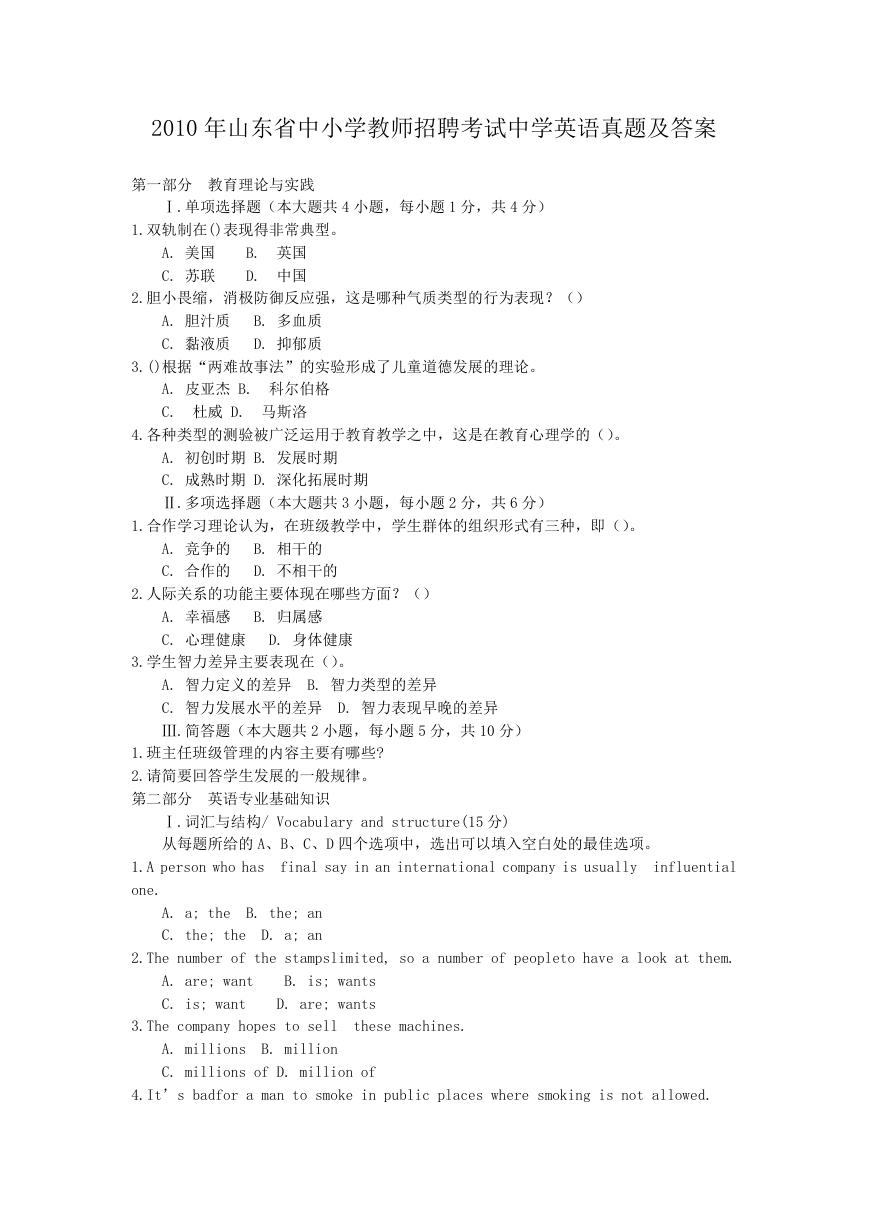
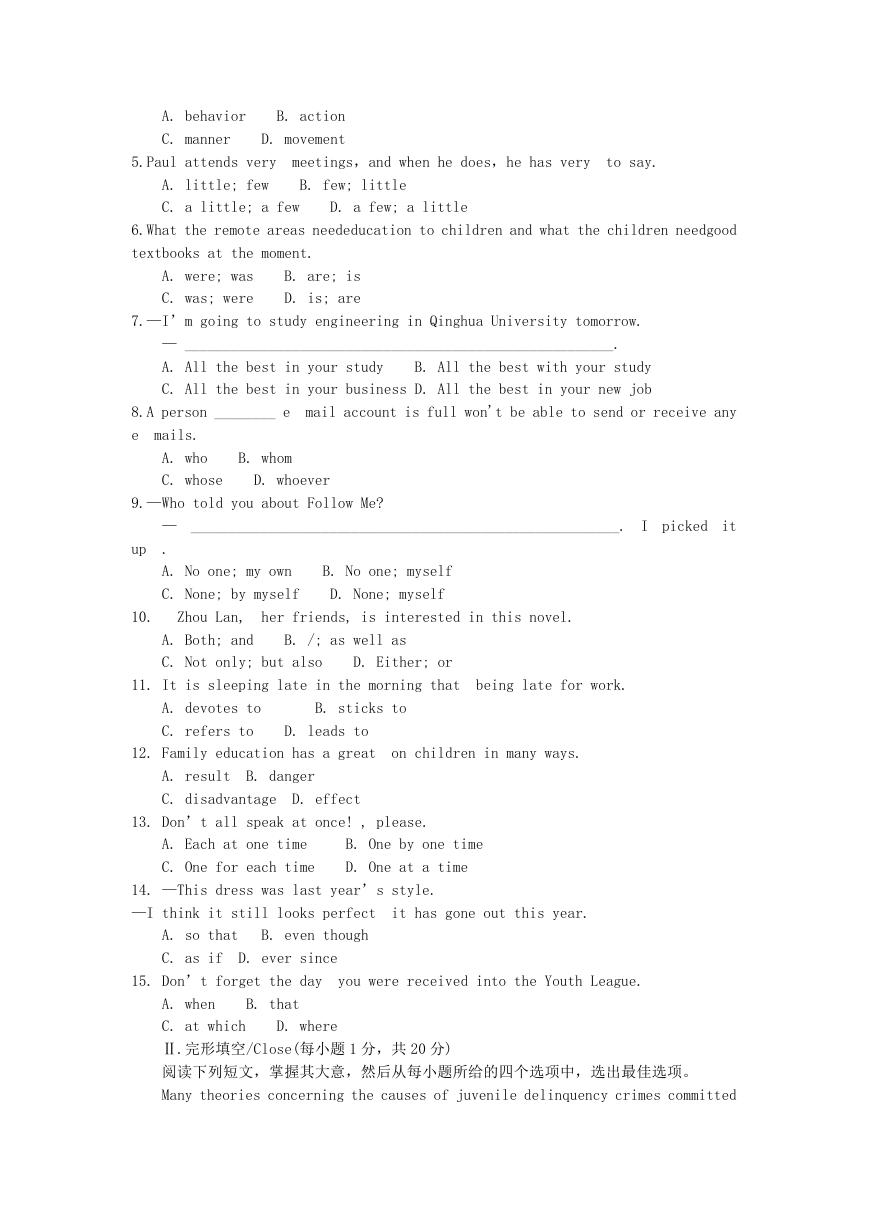
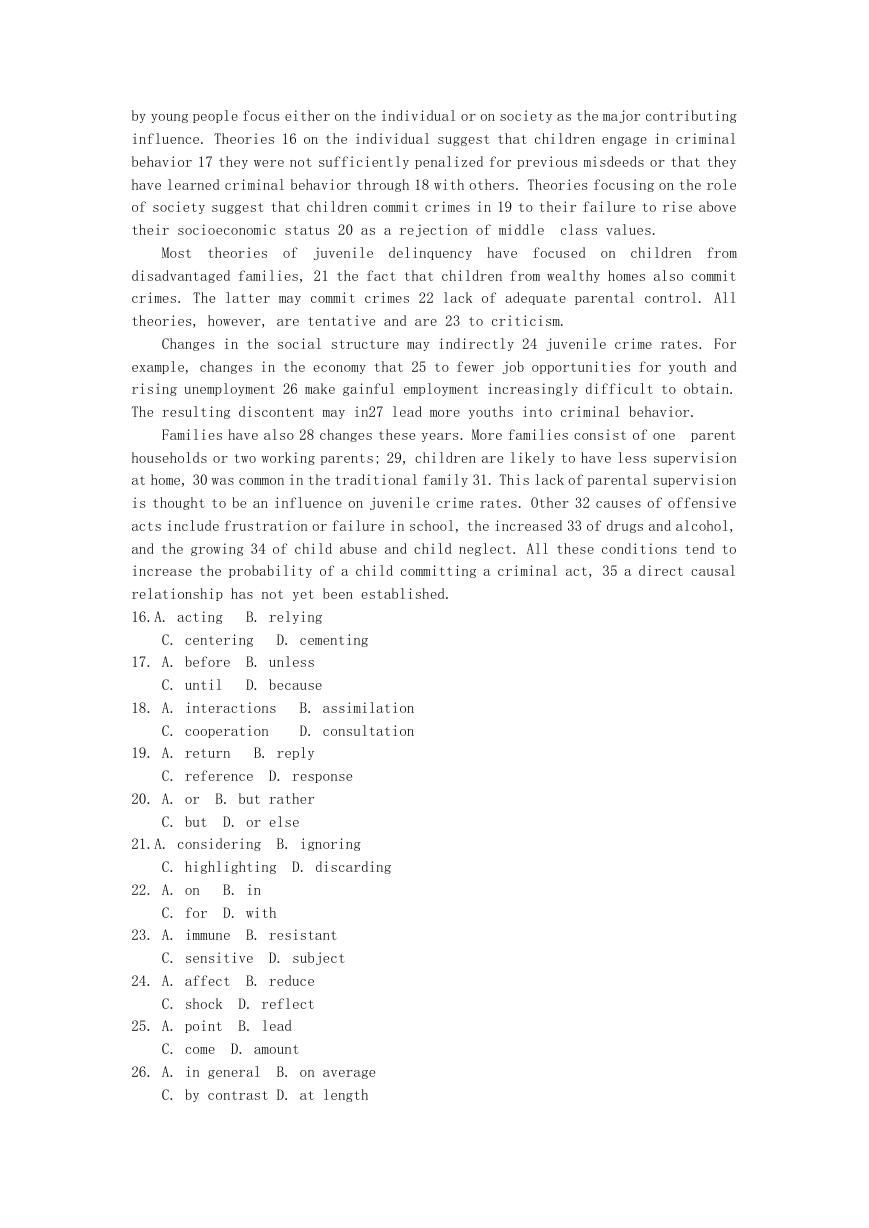
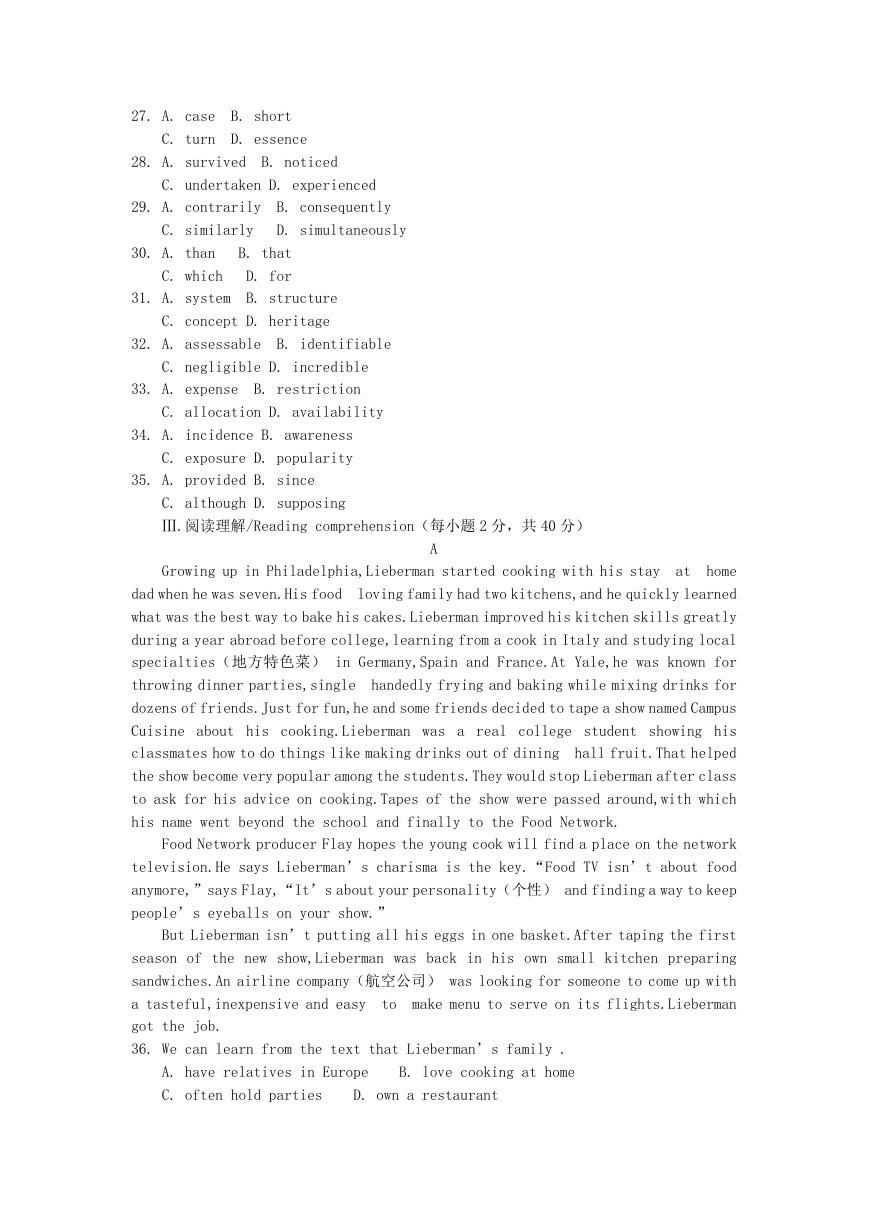
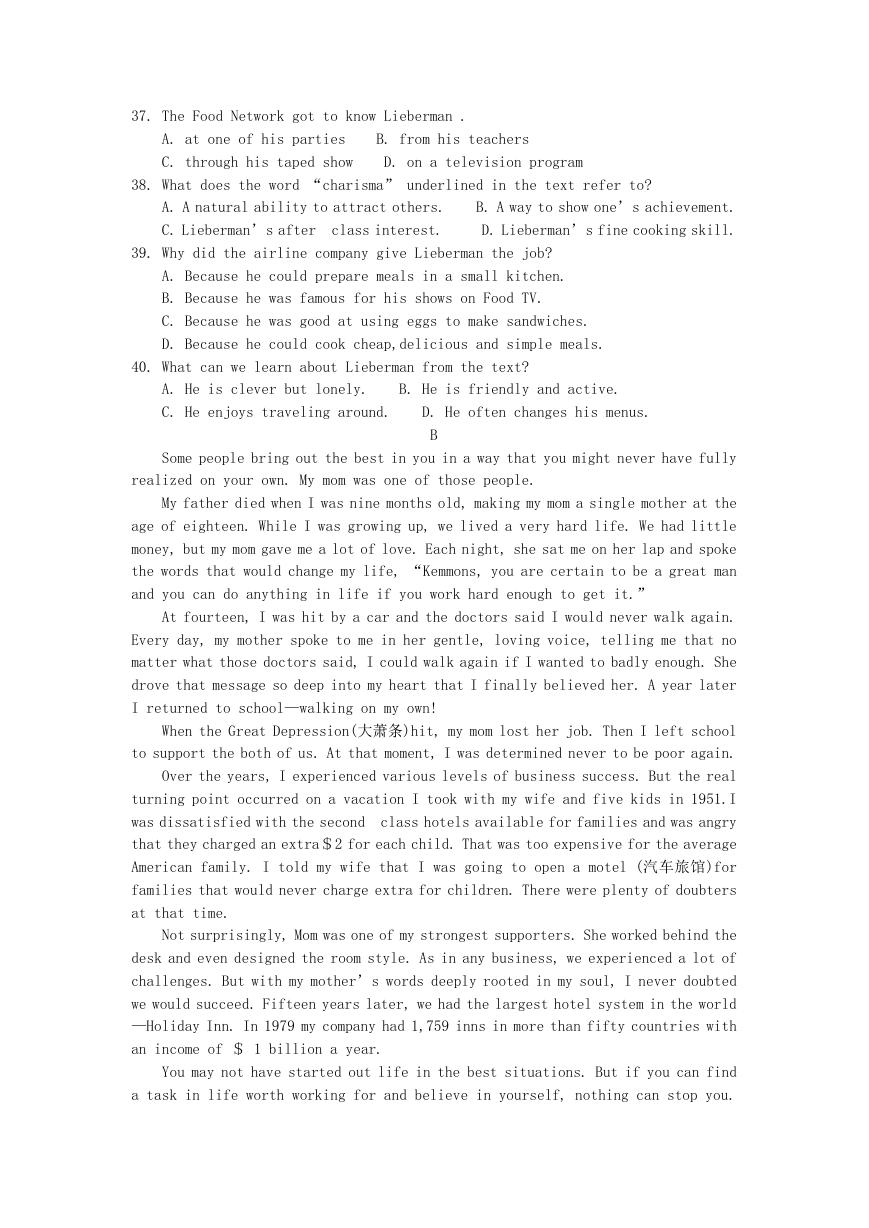
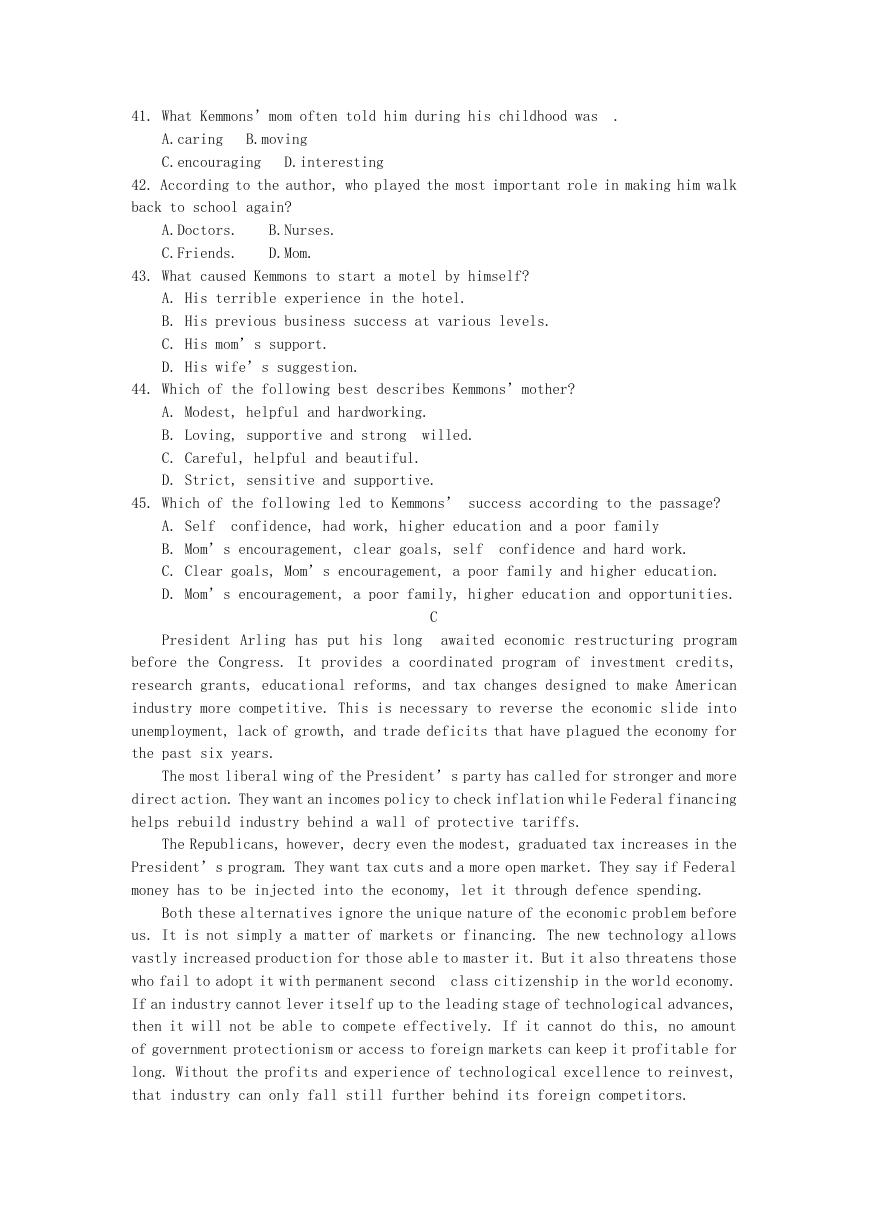
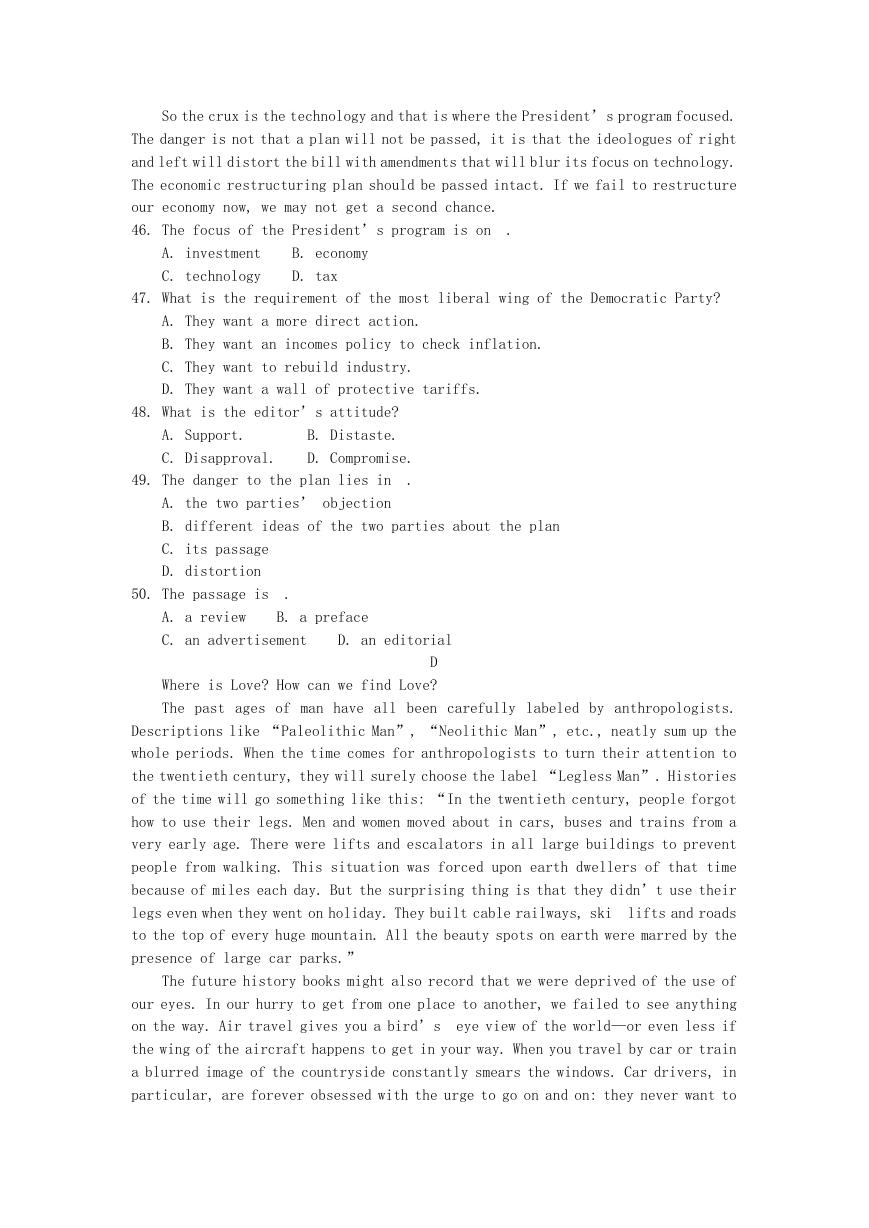
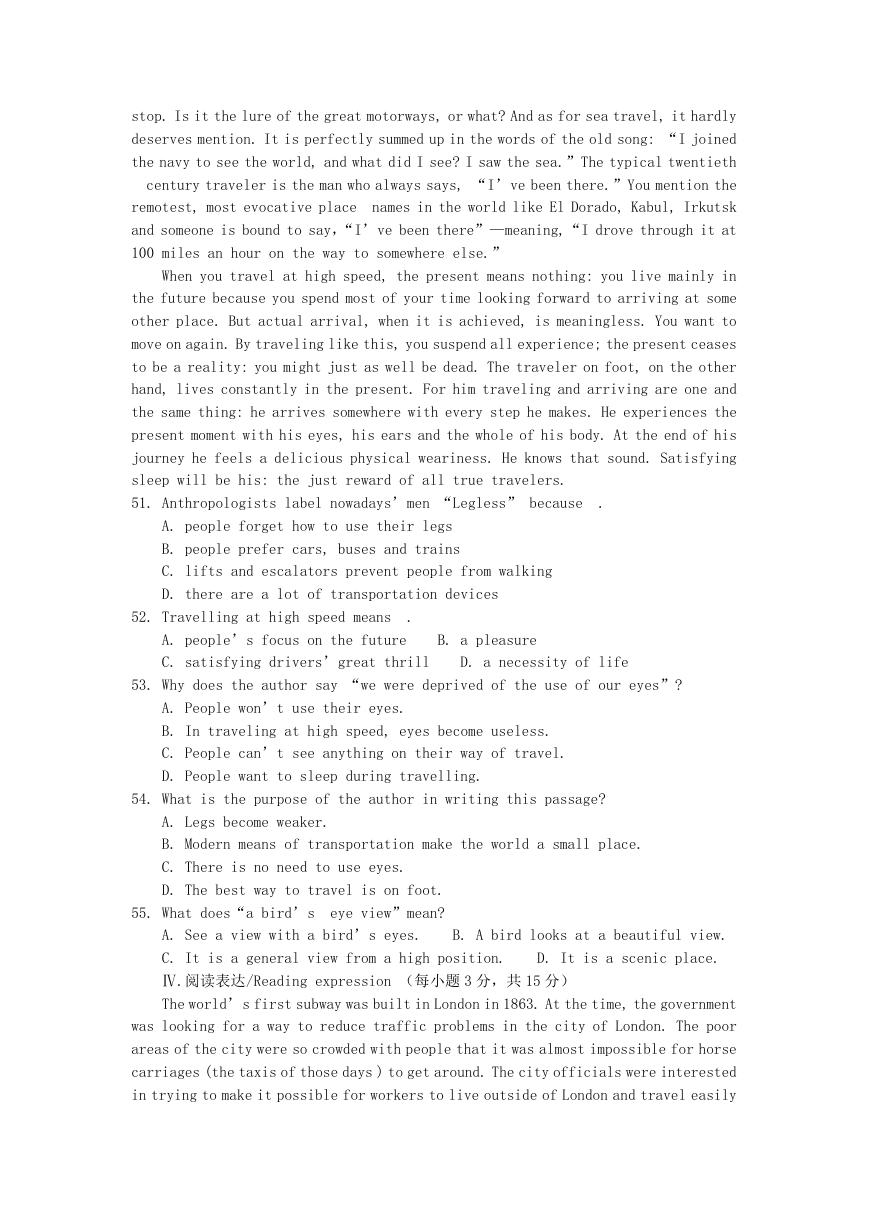








 2023年江西萍乡中考道德与法治真题及答案.doc
2023年江西萍乡中考道德与法治真题及答案.doc 2012年重庆南川中考生物真题及答案.doc
2012年重庆南川中考生物真题及答案.doc 2013年江西师范大学地理学综合及文艺理论基础考研真题.doc
2013年江西师范大学地理学综合及文艺理论基础考研真题.doc 2020年四川甘孜小升初语文真题及答案I卷.doc
2020年四川甘孜小升初语文真题及答案I卷.doc 2020年注册岩土工程师专业基础考试真题及答案.doc
2020年注册岩土工程师专业基础考试真题及答案.doc 2023-2024学年福建省厦门市九年级上学期数学月考试题及答案.doc
2023-2024学年福建省厦门市九年级上学期数学月考试题及答案.doc 2021-2022学年辽宁省沈阳市大东区九年级上学期语文期末试题及答案.doc
2021-2022学年辽宁省沈阳市大东区九年级上学期语文期末试题及答案.doc 2022-2023学年北京东城区初三第一学期物理期末试卷及答案.doc
2022-2023学年北京东城区初三第一学期物理期末试卷及答案.doc 2018上半年江西教师资格初中地理学科知识与教学能力真题及答案.doc
2018上半年江西教师资格初中地理学科知识与教学能力真题及答案.doc 2012年河北国家公务员申论考试真题及答案-省级.doc
2012年河北国家公务员申论考试真题及答案-省级.doc 2020-2021学年江苏省扬州市江都区邵樊片九年级上学期数学第一次质量检测试题及答案.doc
2020-2021学年江苏省扬州市江都区邵樊片九年级上学期数学第一次质量检测试题及答案.doc 2022下半年黑龙江教师资格证中学综合素质真题及答案.doc
2022下半年黑龙江教师资格证中学综合素质真题及答案.doc